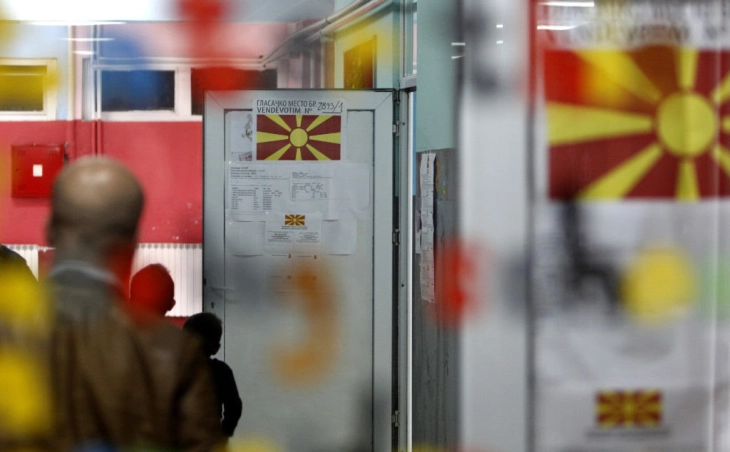Panel: Institutional cooperation key to ensuring fair and democratic election process
- Coercion, cyber attacks, inadequate infrastructure, logistical obstacles, disinformation campaign, each of these risks represents a threat to the credibility of the election processes. In facing these risks, the State Election Commission (SEC) cannot work in isolation, but joint cooperation of all stakeholders is essential, SEC President Aleksandar Dashtevski said on Wednesday.
- Post By Nevenka Nikolik
- 16:36, 27 March, 2024

Skopje, 27 March 2024 (MIA) – Coercion, cyber attacks, inadequate infrastructure, logistical obstacles, disinformation campaign, each of these risks represents a threat to the credibility of the election processes. In facing these risks, the State Election Commission (SEC) cannot work in isolation, but joint cooperation of all stakeholders is essential, SEC President Aleksandar Dashtevski said on Wednesday.
Speaking at a panel discussion on strengthening cooperation between institutions in assessing election risks, Dashtevski said such risks require comprehensive strategies to facilitate institutional response.

"We have already stepped up cooperation with the Ministry of Interior, and we have also adopted regulations for the police in the election process. In addition, cybersecurity agencies are important in the age of digitalization, and the protection of electoral infrastructure in times of cyber threats is paramount. Cooperation with authorities in terms of cybersecurity helps with threats to election systems, securing voter databases, and mitigating the risk of electronic systems and databases being compromised or tampered with. However, the Electoral Code also points to cooperation with other ministries. Civil society organizations are also important here as they play a key role in promoting transparency. Cooperation with organizations improves information efforts and strengthens mechanisms for monitoring election irregularities. Cooperation with the media is also very important, and this cycle of elections the SEC and MIA organized a workshop for journalists," said Dashtevski.
Other representatives of institutions involved in the election process also attended the event aimed at strengthening cooperation between various institutions in the process of assessing electoral risks before the upcoming elections, as well as informing citizens and the public about the meaning and role of cooperation between institutions in the election process.
Caretaker Minister of Interior Panche Toshkovski said that in order to ensure fair and democratic elections, the Ministry of Interior has worked intensively on the training of police officers and inclusiveness in the approach. He noted that a handbook on the conduct of police officers has been developed with the support of OSCE and ODIHR.
Chief Public Prosecutor Ljupcho Kocevski highlighted the role and importance of the Public Prosecutor's Office in the prevention of possible risks in the election period.

"Free elections and the rule of law are the core segments in a state. These two principles are inextricably linked and are key to the respect of all human rights. The responsibility to protect these principles is huge for all institutions that are part of this debate. Many acts of coercion, abuse, violence, intimidation can be seen during elections over the years, and such acts can affect the course of the elections. Therefore, the vigilance of the Public Prosecutor's Office has increased for several election and voting cycles, precisely to detect such possible threats to the free expression of citizens' will," Kocevski said.
He noted that the Public Prosecutor's Office has set up a committee tasked with monitoring possible election irregularities that could disrupt the democratic process.
As regards the dynamics, he said that all cases related to possible election irregularities will be treated as priority cases.
The Deputy Minister at the Ministry of Information Society and Administration, Stefan Andonovski, spoke of massive "pre-election bribery" with thousands of new employees hired in the public sector.
He mentioned that for some of those employment candidates, whose procedures have not been completed, there is unofficial information that some of them were pressured to organize people to vote in the elections.
President of the State Commission for the Prevention of Corruption, Tatjana Dimitrovska, pointed out that the latest amendments to the criminal code have not resolved a very significant issue related to online media, i.e. the advertising of the participants in the election campaign on web portals, which included a large share in the state budget.
"In the election campaign, web portals, media, include a significant share of money from the state budget, 25 percent of the state budget, or EUR 2.5 million, are transferred to online media, which as an advertising instrument are not regulated by any law nor is their advertising controlled," said Dimitrovska.

She added that since the elections were called, the anti-corruption commission has received about 20 complaints.
"In accordance with the Electoral Code, we have opened cases, submitted requests to the institutions for all the necessary documents, and we will take further measures after receiving the necessary data. We are also continuously answering all reporters' questions and are as transparent as possible," Dimitrovska said.
She added among other that the anti-corruption commission also has a significant role in monitoring the financing of the election campaign.
"We have the authority to monitor and analyse the financial transactions and financing of the election campaign in order to discover what irregularities exist. So we have been granted legal online access to the accounts of all participants in the campaign, and we will proceed to analysis," said Dimitrovska.
The event was organized by the Ohrid Institute.
Photo: MIA







